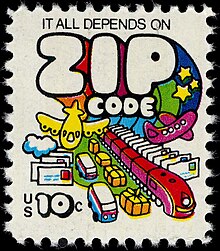
Back አካባቢያዊ መለያ ቁጥር Amharic رموز بريد الولايات المتحدة Arabic ZIP код Bulgarian জিপ কোড Bengali/Bangla ᎪᏪᎵ ᏧᏪᏓᏍᏗ ᏗᏎᏍᏗ CHR ZIP-Code German Poŝtkodoj en Usono Esperanto Código ZIP Spanish زیپکد Persian Code ZIP French

A ZIP Code (an acronym for Zone Improvement Plan[1]) is a system of postal codes used by the United States Postal Service (USPS). The term ZIP was chosen to suggest that the mail travels more efficiently and quickly[2] (zipping along) when senders use the code in the postal address. The Philippine Postal Corporation also uses this terminology for the postal code system in the Philippines.[3]
Introduced on July 1, 1963, the basic format comprised five digits.[4] In 1983, an extended code was introduced named ZIP+4; it included the five digits of the ZIP Code, followed by a hyphen and four digits that designated a more specific location.
ZIP Code and ZIP+4 are registered trademarks of the United States Postal Service, which also registered ZIP Code as a service mark until 1997.[5]
- ^ Curtin, Abby. "Flashing Across the Country: Mr. Zip and the ZIP Code Promotional Campaign". Smithsonian National Postal Museum. Archived from the original on May 30, 2023. Retrieved May 30, 2023.
- ^ "The Untold Story of the ZIP Code" (PDF). U.S. Postal Service Office of Inspector General. April 1, 2013. Archived from the original (PDF) on December 29, 2016. Retrieved March 11, 2020.
When Day unveiled the nationwide 5-digit ZIP Code at a postmasters' convention in October of 1962, he simultaneously introduced the world to "Mr. ZIP" — the cartoon character whose body language symbolizes speedy delivery.
- ^ "ZIP Code Locator", PhlPost, retrieved February 29, 2020
- ^ Terrell, Ellen (June 28, 2013). "This Month in Business History: ZIP Code Introduced". Library of Congress Research Guides. Archived from the original on October 29, 2021. Retrieved July 31, 2022.
- ^ "Latest Status Info". United States Patent and Trademark Office. Archived from the original on June 30, 2012. Retrieved December 22, 2019.